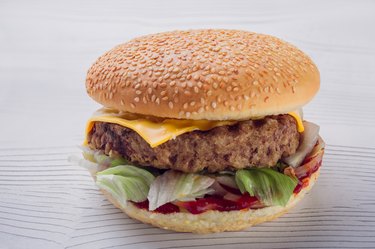
You probably already know that a Burger King Whopper sandwich is not exactly a health food, but just how unhealthy is it? Will the Whopper calories set you back for the whole day, or can you work them into an otherwise healthy diet plan?
When it comes to fast food, it's not just about the calories. Fast food has also been directly linked to health problems, like diabetes, heart disease, eczema and asthma. While all Burger King nutrition facts leave something to be desired, there are some ways you can make better choices if fast food is your only option.
Video of the Day
Video of the Day
Tip
A regular size Whopper with cheese contains 790 calories, while a double Whopper with cheese clocks in at 1,061 calories. If you add fries on the side, you're looking at an additional 207 to 448 calories, depending on which size you choose.
Calculating Whopper Calories
If you get a regular size Whopper with cheese and you eat the whole thing, you're looking at a whopping (pun intended) 790 calories for just the burger. If go for the double Whopper, the calorie count goes up to 1,061. Of course, if you're getting a Whopper, chances are you might be getting some French fries to go on the side.
Choose a small side of French fries and you'll add 207 calories to your meal. A large serving will set you back 448 calories, while a medium falls in the middle at 328 calories for the entire portion.
If you're more concerned with the carbs in a Whopper, you're looking at around 53 grams for an entire single Whopper and just a little more — or 54 grams — for a double Whopper. However, only a small amount of those carbohydrates are in the form of fiber. A single Whopper contains 3.2 grams of fiber and the bigger double Whopper has 6.4 grams.
Other Fast Food Dangers
But, when it comes to fast food, it's not just the calories that are important. There have actually been studies on the potential dangers of fast food that don't really have anything to do with the calories, but with the food package, as a whole.
One slightly older study that was published in Public Health Nutrition in March 2012 found a link between eating fast foods, like hamburgers, and depression. Researchers from this study pointed out that there was a connection between the two even independently of the other types of foods that were eaten. In other words, it didn't matter what else participants were eating; if fast food was a part of their diet, they were more likely to feel depressed.
Another study in a July 2012 issue of Circulation found a connection between eating fast food two or more times per week and an increased risk of developing Type 2 diabetes and dying from coronary heart disease.
Researchers from one more study that was published in Thorax in January 2013 looked at how fast food consumption affected children and adolescents and found that eating fast food three or more times per week increased the risk of severe asthma, severe eczema and severe rhinoconjunctivitis, which is characterized by:
- Nasal congestion
- Runny nose
- Post-nasal drip
- Sneezing
- Red, inflamed eyes (conjunctivitis)
- Itchy nose or eyes
Choosing Healthier Fast Food Options
So, what can you do if fast food is your only option? Although it may not be the healthiest food out there, you can make better choices. MedlinePlus provides some tips to help you navigate a fast food menu:
- Choose grilled options, like chicken, instead of fried.
- Get a single meat patty burger rather than a double.
- Skip the cheese and any sauce and ask for extra lettuce, tomatoes and onions.
- Opt for a side salad over French fries.
- Ask for salad dressing on the side.
- Limit ketchup, which often has added sugar in the form of high-fructose corn syrup, and opt for mustard instead.
- Order smaller sizes.
- Choose water instead of soda or a milkshake.
- USDA National Nutrient Database for Standard Reference: "Burger King, Whopper, With Cheese"
- USDA National Nutrient Database for Standard Reference: "Burger King, Double Whopper, With Cheese"
- USDA National Nutrient Database for Standard Reference: "Burger King, French Fries"
- Medline Plus: "Fast Food Tips"
- Thorax: "Do Fast Foods Cause Asthma, Rhinoconjunctivitis and Eczema? Global Findings From the International Study of Asthma and Allergies in Childhood (Isaac) Phase Three"
- Circulation: "Western-Style Fast Food Intake and Cardiometabolic Risk in an Eastern Country"
- Public Health Nutrition: "Fast-Food and Commercial Baked Goods Consumption and the Risk of Depression"